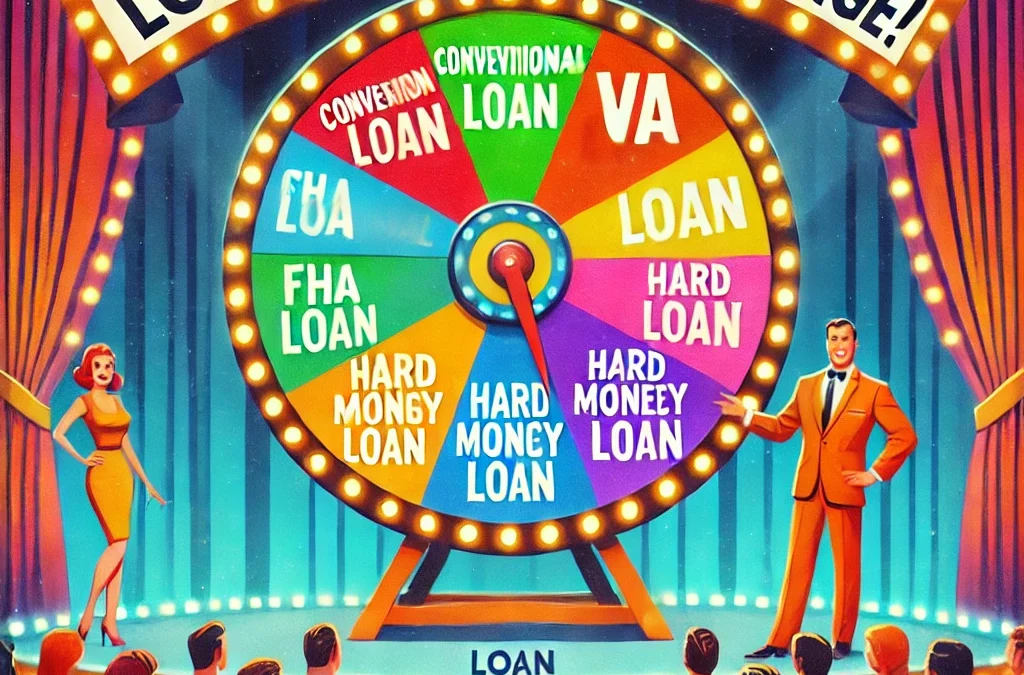Investing in real estate often requires financing, and choosing the right type of loan is crucial. Different loans cater to various needs, whether you’re buying a home, investing in rental properties, or developing commercial spaces. Below is a guide to the most common types of real estate loans and their key features.
Contents
Conventional Loans
- Overview: Offered by private lenders and not backed by government programs.
- Key Features:
- Competitive interest rates.
- Fixed or adjustable rates available.
- Requires good credit (typically 620+).
- Down payment: 3%–20% depending on the lender and program.
Ideal for: Primary residences, second homes, and investment properties.
FHA Loans
- Overview: Backed by the Federal Housing Administration (FHA), designed for first-time homebuyers and those with lower credit scores.
- Key Features:
- Lower credit score requirements (as low as 500 with a 10% down payment).
- Down payment as low as 3.5% (with 580+ credit).
- Requires mortgage insurance premium (MIP).
Ideal for: Buyers with limited savings or credit challenges.
VA Loans
- Overview: Exclusively for eligible veterans, active-duty military members, and their families.
- Key Features:
- No down payment required.
- Competitive interest rates.
- No private mortgage insurance (PMI).
- Backed by the Department of Veterans Affairs.
Ideal for: Qualified military personnel and their families.
USDA Loans
- Overview: Backed by the U.S. Department of Agriculture, these loans are for rural and suburban homebuyers with low to moderate income.
- Key Features:
- No down payment required.
- Low interest rates.
- Property must meet location and eligibility criteria.
Ideal for: Homebuyers in rural areas with limited income.
Commercial Real Estate Loans
- Overview: Tailored for purchasing or refinancing commercial properties such as office buildings, retail spaces, or apartment complexes.
- Key Features:
- Higher loan amounts.
- Typically requires 20%–30% down.
- Structured as fixed-rate, interest-only, or balloon loans.
Ideal for: Business owners and investors in commercial property.
Bridge Loans
- Overview: Short-term loans used to “bridge” the gap between buying a new property and selling an existing one.
- Key Features:
- High-interest rates.
- Short repayment periods (6 months to 3 years).
- Secured by the borrower’s current property.
Ideal for: Homebuyers needing quick financing.
Hard Money Loans
- Overview: Offered by private lenders, based on the value of the property rather than the borrower’s credit.
- Key Features:
- High-interest rates.
- Short repayment terms (usually 1–3 years).
- Easier approval process.
Ideal for: Real estate investors and house flippers.
HELOCs (Home Equity Line of Credit)
- Overview: A revolving line of credit secured by the equity in your home.
- Key Features:
- Flexible borrowing terms.
- Interest-only payments during the draw period.
- Rates can be variable or fixed.
Ideal for: Renovations, home improvements, or other expenses.
Choosing the Right Loan
When deciding on a real estate loan, consider these factors:
- Purpose: Is it for personal use, investment, or business?
- Creditworthiness: Your credit score affects eligibility and interest rates.
- Repayment Ability: Analyze your income and financial stability.
- Loan Terms: Compare interest rates, down payment requirements, and repayment terms.
